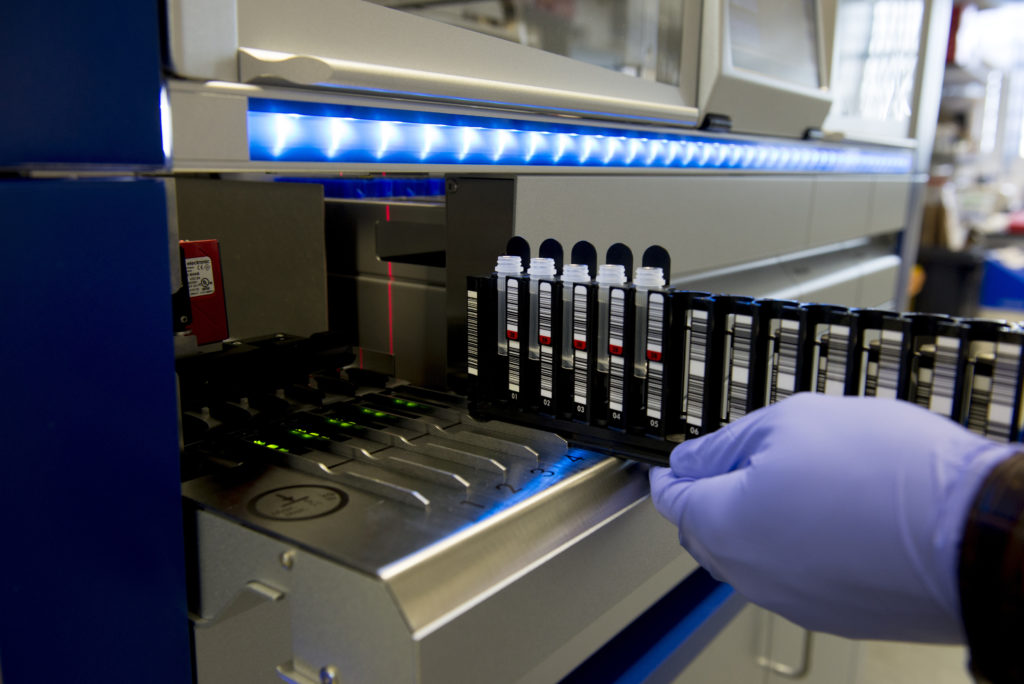University of Oxford researchers, working in an unprecedented vaccine development effort to prevent COVID-19, have started screening healthy volunteers ahead of a vaccine trial.
The NIHR Oxford Biomedical Research Centre (BRC) provided essential funding to get the trial up and running.

The team will enrol healthy volunteers aged between 18 and 55, who, if they pass screening, will be the first humans to test the new vaccine, called ChAdOx1 nCoV-19, which is based on an adenovirus vaccine vector. The SARS-CoV-2 spike protein is already in production, although it will not be ready for some weeks yet.
The trial will provide valuable information on the safety aspects of the vaccine, as well as its ability to generate an immune response against the virus. Interested individuals can volunteer to participate on the COVID-19 vaccine website.
The trial, a collaboration between the University’s Jenner Institute and Oxford Vaccine Group clinical teams, will recruit up to 510 volunteers, who will receive either the ChAdOx1 nCoV-19 vaccine or a control injection for comparison.
Whilst the team will start screening people now to see if they are eligible to take part in the study, participants will not receive the vaccine for some weeks.
Detailed preclinical work is being done and the vaccine is being manufactured to clinical grade standard at the Clinical Biomanufacturing Facility at Oxford University.
The trial has been approved by UK regulators and ethical reviewers. Researchers are working as quickly as possible to get the vaccine ready to be used in the trial, which includes further preclinical investigations and production of a larger number of doses of the vaccine.
Professor Adrian Hill, Director of the Jenner Institute and the Oxford BRC Theme Lead for Vaccines, said: “The Oxford team had exceptional experience of a rapid vaccine response, such as to the Ebola outbreak in West Africa in 2014. This is an even greater challenge. Vaccines are being designed from scratch and progressed at an unprecedented rate. The upcoming trial will be critical for assessing the feasibility of vaccination against COVID-19 and could lead to early deployment.”
Professor Andrew Pollard, Chief Investigator on the study and the Oxford BRC’s Co-theme Lead for Vaccines, added: “Starting the clinical trials is the first step in the efforts to find out whether the new vaccine being developed at Oxford University works and could safely play a central role in controlling the pandemic coronavirus that is sweeping the globe.”
Scientists around the world are working hard to develop a vaccine to prevent COVID-19, but there is a lot to be done. The Oxford team led by Prof Sarah Gilbert, Prof Pollard, Prof Teresa Lambe, Dr Sandy Douglas and Prof Hill started work designing a vaccine on Friday 10January 2020.
The vaccine is an adenovirus vaccine vector (ChAdOx1) and was developed at Oxford’s Jenner Institute. It was chosen as the most suitable vaccine technology for a SARS-CoV-2 (COVID-19) vaccine as it can generate a strong immune response from one dose and it is not a replicating virus, so it cannot cause an ongoing infection in the vaccinated individual.
This also makes it safer to give to children, the elderly and anyone with a pre-existing condition such as diabetes.
Adenoviral vectors are a very well-studied vaccine type, having been used safely in thousands of subjects, from 1 week to 90 years of age, in vaccines targeting over 10 different diseases.
Coronaviruses have club-shaped spikes on their outer coats. Immune responses from other coronavirus studies suggest that these are a good target for a vaccine. The Oxford vaccine contains the genetic sequence of this surface spike protein inside the ChAdOx1 construct. After vaccination, the surface spike protein of the coronavirus is produced, which primes the immune system to attack the coronavirus if it later infects the body. Professor Gilbert and team have previously developed a vaccine for another human coronavirus disease, which is Middle East Respiratory Syndrome (MERS), and this has shown promise in early clinical trials.
Professor Gilbert, lead researcher of the vaccine development programme, said, “Since the Ebola outbreak in West Africa in 2014, my research team has been working on new approaches to vaccine development to protect the population of the world against an outbreak of infectious disease or a pandemic. We are now working with a much larger team to bring these plans to fruition.”
At the same time as conducting the first clinical trial, production of the vaccine is being scaled up ready for larger trials, and potentially, future deployment. By starting vaccine manufacturing scale-up immediately, the team can ensure that enough vaccine doses are available as soon as possible – especially for NHS workers, the elderly and those with underlying health conditions – if the trials prove that the vaccine is safe and effective.
Dr Sandy Douglas, who is leading on the vaccine manufacturing scale-up project, said: “The scale of this epidemic poses a huge challenge for vaccine manufacturing. We need to follow rigorous safety standards and that takes time. By starting work on large-scale manufacturing immediately, we hope to accelerate the availability of high quality, safe vaccine.”
Professor Teresa Lambe, who is leading the early stages of vaccine development, said: “The commitment, compassion and helpfulness felt throughout the whole effort from everyone we have been working with has been amazing. We deeply appreciate the support of all our collaborators, funders and the teams around us in getting to this stage with the speed we have.”
This study has received funding from the rapid research response funded by UK Research and Innovation (UKRI), and by the Department of Health and Social Care through the National Institute for Health Research (NIHR). The NIHR have also provided funding for the set-up of the project through the Oxford BRC
For further information on the vaccine visit: https://covid19vaccinetrial.co.uk/